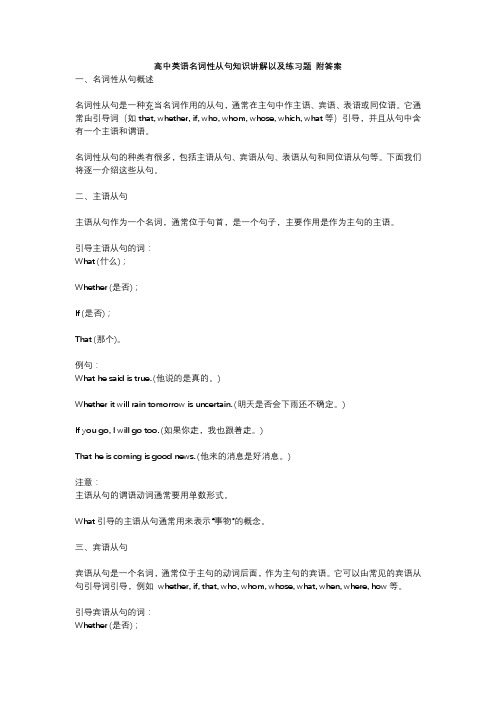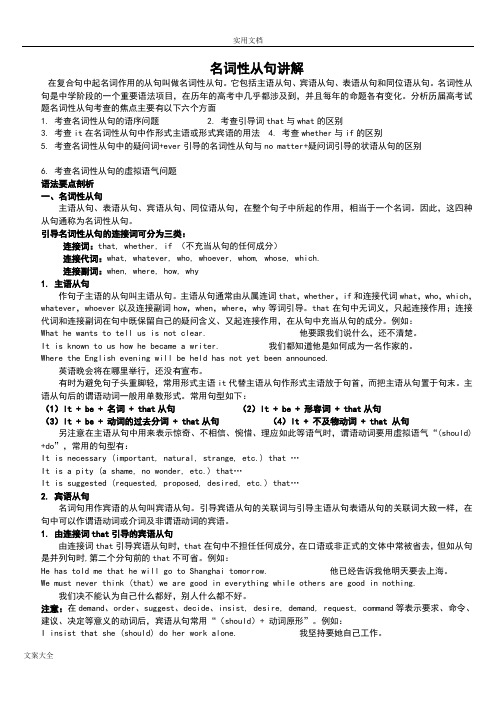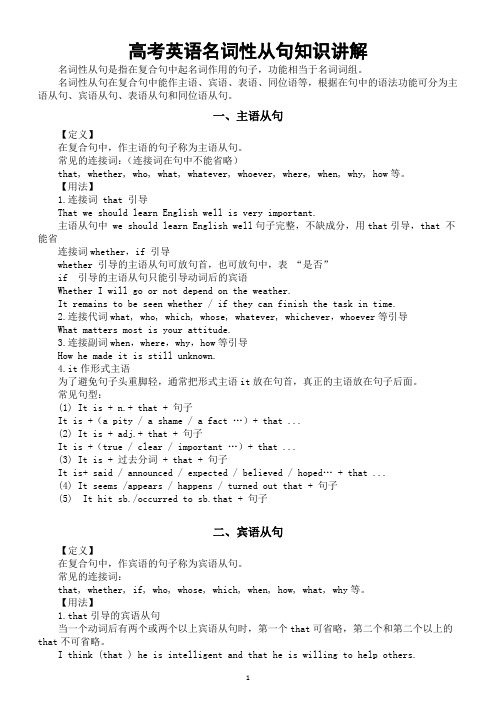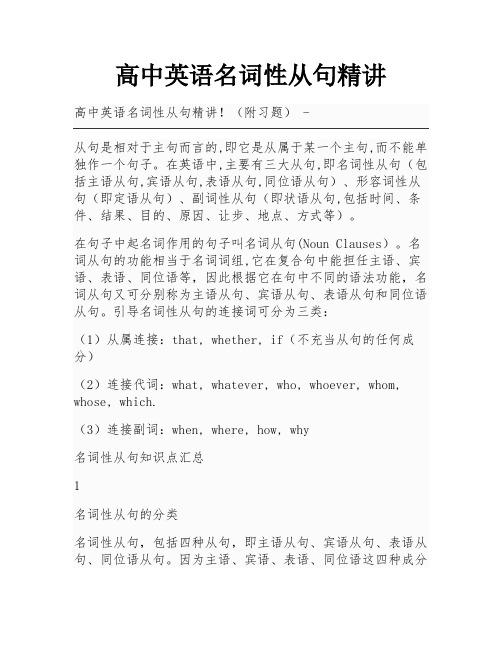高中名词性从句讲解
高中英语名词性从句详解(最新整理)

I made it clear that I was determined to carry out the plan. I consider it necessary that we should spend more time practising spoken
English. We think it possible that the young master at least two foreign languages. ⑥某些动词后面,宾语从句的谓语要求用虚拟。 这类动词常见的有:command(命令), demand(要求), desire(希望), insist(坚持), order(命令), propose(提议), recommend(推荐), request(要求), require(要求), suggest(建议)等。 He proposed that we ( should ) set a dead line for the complement of the plan . 他提议拟定一个执行计划的期限
在①句中,划线部分是定语从句,其先行词是名词 boy,它不能用作同位语 从句的先行词。 在②句中,划线部分也是定语从句,其先行词是代词 those,代词不能用作 同位语从句的先行词。 在③句中,划线部分是同位语从句,其先行词是名词 fact,它同样可以用作 定语从句的先行词,④句便是一例。 由以上分析可见,同位语从句的先行词一定可以用作定语从句的先行词,但 定语从句的先行词不一定能用作同位语从句的先行词。 2.when,where,why 引导的定语从句的先行词一定分别是表示时间、地 点和原因的名词,而三者引导的同位语从句的先行词则肯定不是表示时间、地 点和原因的名词。例如:
注意事项:定从与同位语从句的区别,不要混淆哦!
高中英语名词性从句知识讲解以及练习题 附答案

高中英语名词性从句知识讲解以及练习题附答案一、名词性从句概述名词性从句是一种充当名词作用的从句,通常在主句中作主语、宾语、表语或同位语。
它通常由引导词(如that, whether, if, who, whom, whose, which, what等)引导,并且从句中含有一个主语和谓语。
名词性从句的种类有很多,包括主语从句、宾语从句、表语从句和同位语从句等。
下面我们将逐一介绍这些从句。
二、主语从句主语从句作为一个名词,通常位于句首,是一个句子,主要作用是作为主句的主语。
引导主语从句的词:What (什么);Whether (是否);If (是否);That (那个)。
例句:What he said is true. (他说的是真的。
)Whether it will rain tomorrow is uncertain. (明天是否会下雨还不确定。
)If you go, I will go too. (如果你走,我也跟着走。
)That he is coming is good news. (他来的消息是好消息。
)注意:主语从句的谓语动词通常要用单数形式。
What引导的主语从句通常用来表示“事物”的概念。
三、宾语从句宾语从句是一个名词,通常位于主句的动词后面,作为主句的宾语。
它可以由常见的宾语从句引导词引导,例如whether, if, that, who, whom, whose, what, when, where, how等。
引导宾语从句的词:Whether (是否);If (是否);That (那个);Who (谁);Whom (谁);Whose (谁的);What (什么);When (何时);Where (何处);How (如何)。
例句:I know that he is coming. (我知道他要来。
)I wonder if he is telling the truth. (我想知道他是否说了真话。
高中名词性从句详细讲解+例句

名词性从句I. !"#$%&一、定义名词性从句是在句子中起名词作用的句子。
它在复合句中能担任主语、宾语、表语、同位语,分别称为主语从句、宾语从句、表语从句和同位语从句。
二、分类&表语从句1) That is(系动词) a book.S + P 表语2) The fact is(系动词)that he has lied to usS + P 表语从句&宾语从句1) He said(vt) nothing at the meeting.S + P 宾语2) He said (vt) (that) he would help us without hesitation.S + P 宾语从句3) He is interested in (prep) what we want for breakfast.S + P 宾语从句&主语从句1) His mistakes made his teacher angry.主语+ P2) That he made so many mistakes made his teacher angry.主语从句P3)What he said made his teacher angry.主语从句P&同位语从句1) You can turn to my friend Tom for help.S + P 同位语2) The announcement that a new airport was to be built nearby made us excited.S 同位语从句+ P3) We heard the news that the war had broken out between America and Iraq.S + P 同位语从句三、引导词名称引导词在从句中担任成分连接词that, whether, if 不作成分连接代词what, whatever, who, whoever, whose, which, whichever 主语、宾语、表语、定语连接副词when, where, why, how, whenever, wherever, however 状语例如:a. He said that he would come.b. Whether he can pass the exam is not certain.c. He agrees with what I said.d. He agrees with what was said.e. I don’t know what present I should buy.f. That is where Tom used to live.g. That’s why he left.四、名词性从句语序名词性从句用陈述句语序。
高中英语名词性从句讲义(超详细版)

名词性从句一.定义:在句子中起名词作用的句子叫名词性从句 (Noun Clauses)。
名词性从句的功能相当于名词词组, 它在复合句中能担任主语、宾语、表语、同位语、介词宾语等,因此根据它在句中不同的语法功能,名词性从句又可分别称为主语从句、宾语从句、表语从句和同位语从句。
1. His words are true. What he said is true.2. The dog sensed something good. The dog sensed that there was something good nearby.3. These are his words. These are what he said.4. My Maths teacher, Mr He, is a kind person. The news that the plane had crashed made us sad.二.引导名词性从句的连接词连词:在从句中不充当成分,只起连接作用 that, 无实义whether, if 是否as if \ as though 似乎,好像连接代词:有词义,在句中担任主语,表语,定语或宾语。
what, 什么 who, 谁whom, 谁,作宾语 whose, 谁的 which, 哪一个whatever, whoever……也可以引导。
连接副词:有词义,在句中担任状语。
when ,什么时候 where, 什么地方 why, 为什么 how ,怎么样how many, how much, how often三.主语从句1. 作句子主语的从句叫主语从句。
What he wants to tell us is not clear. 他要跟我们说什么,还不清楚。
It is known to us how he became a writer. 我们都知道他是如何成为一名作家的。
That he is late for school makes the teacher very angry. 他上学迟到让老师很生气。
高中名词性从句语法精讲详解

高中名词性从句语法详解名词性从句:宾主同表(宾从,主从,同从,表从)一、宾语从句宾语从句的类型(1)主语+谓语+宾语从句He said that he wouldn’t take part in the sports meeting.(2)主语+be+adj+宾语从句I’m sure that our team will win.☆只限于少数adj. sure, certain, afraid, confident, etc(3)主语+谓语+宾(表)语+介词+宾语从句(except, in that在于,因为)He is a good student except that he is a little careless.I like the city,but I like the country better in that I have more friends there1. 宾语从句的连接词1)连词that,只起连接作用,在从句中不作句子成分,也无词汇意义,在口语中常被省略★由that 引导的宾语从句在以下情况下不能省略:(1).在主+谓+it(形式宾语)+宾补+that从句(真正宾语) 的句型中:表喜欢、憎恶等心理活动的动词或词组后习惯上先跟形宾it:hate, love, enjoy, dislike, don’t mind, feel like, appreciate, rely/depend on, count on, see to, take, owe等We must make it clear that we mean what we say.We heard it that she would get married next month.(2).由and连接的两个由that引导的宾语从句中,第二个that 不省略.He told me (that) he would come and that he would come on time. (3) 从句前有插入语:He may tell you, for example, that she is interested in Chinese(4)从句主语是that时:He says that that is a useful book(5)当that从句是双宾语中的直接宾语时,that不可省。
(完整word)高中英语名词性从句讲解

名词性从句讲解在复合句中起名词作用的从句叫做名词性从句。
它包括主语从句、宾语从句、表语从句和同位语从句。
名词性从句是中学阶段的一个重要语法项目,在历年的高考中几乎都涉及到,并且每年的命题各有变化。
分析历届高考试题名词性从句考查的焦点主要有以下六个方面1. 考查名词性从句的语序问题2. 考查引导词that与what的区别3. 考查it在名词性从句中作形式主语或形式宾语的用法4. 考查whether与if的区别5. 考查名词性从句中的疑问词+ever引导的名词性从句与no matter+疑问词引导的状语从句的区别6. 考查名词性从句的虚拟语气问题语法要点剖析一、名词性从句主语从句、表语从句、宾语从句、同位语从句,在整个句子中所起的作用,相当于一个名词。
因此,这四种从句通称为名词性从句。
引导名词性从句的连接词可分为三类:连接词:that, whether, if (不充当从句的任何成分)连接代词:what, whatever, who, whoever, whom, whose, which.连接副词:when, where, how, why1. 主语从句作句子主语的从句叫主语从句。
主语从句通常由从属连词that,whether,if和连接代词what,who,which,whatever,whoever以及连接副词how,when,where,why等词引导。
that在句中无词义,只起连接作用;连接代词和连接副词在句中既保留自己的疑问含义、又起连接作用,在从句中充当从句的成分。
例如:What he wants to tell us is not clear. 他要跟我们说什么,还不清楚。
It is known to us how he became a writer. 我们都知道他是如何成为一名作家的。
Where the English evening will be held has not yet been announced.英语晚会将在哪里举行,还没有宣布。
高中英语2024届高考名词性从句知识分类讲解(主语从句+宾语从句+表语从句+同位语从句)

高考英语名词性从句知识讲解名词性从句是指在复合句中起名词作用的句子,功能相当于名词词组。
名词性从句在复合句中能作主语、宾语、表语、同位语等,根据在句中的语法功能可分为主语从句、宾语从句、表语从句和同位语从句。
一、主语从句【定义】在复合句中,作主语的句子称为主语从句。
常见的连接词:(连接词在句中不能省略)that, whether, who, what, whatever, whoever, where, when, why, how等。
【用法】1.连接词 that 引导That we should learn English well is very important.主语从句中 we should learn English well句子完整,不缺成分,用that引导,that 不能省连接词whether,if 引导whether 引导的主语从句可放句首,也可放句中,表“是否”if 引导的主语从句只能引导动词后的宾语Whether I will go or not depend on the weather.It remains to be seen whether / if they can finish the task in time.2.连接代词what, who, which, whose, whatever, whichever,whoever等引导What matters most is your attitude.3.连接副词when,where,why,how等引导How he made it is still unknown.4.it作形式主语为了避免句子头重脚轻,通常把形式主语it放在句首,真正的主语放在句子后面。
常见句型:(1) It is + n.+ that + 句子It is +(a pity / a shame / a fact …)+ that ...(2) It is + adj.+ that + 句子It is +(true / clear / important …)+ that ...(3) It is + 过去分词 + that + 句子It is+ said / announced / expected / believed / hoped… + that ...(4) It seems /appears / happens / turned out that + 句子(5) It hit sb./occurred to sb.that + 句子二、宾语从句【定义】在复合句中,作宾语的句子称为宾语从句。
高中英语名词性从句精讲

高中英语名词性从句精讲从句是相对于主句而言的,即它是从属于某一个主句,而不能单独作一个句子。
在英语中,主要有三大从句,即名词性从句(包括主语从句,宾语从句,表语从句,同位语从句)、形容词性从句(即定语从句)、副词性从句(即状语从句,包括时间、条件、结果、目的、原因、让步、地点、方式等)。
在句子中起名词作用的句子叫名词从句(Noun Clauses)。
名词从句的功能相当于名词词组,它在复合句中能担任主语、宾语、表语、同位语等,因此根据它在句中不同的语法功能,名词从句又可分别称为主语从句、宾语从句、表语从句和同位语从句。
引导名词性从句的连接词可分为三类:(1)从属连接:that, whether, if(不充当从句的任何成分)(2)连接代词:what, whatever, who, whoever, whom, whose, which.(3)连接副词:when, where, how, why名词性从句知识点汇总1名词性从句的分类名词性从句,包括四种从句,即主语从句、宾语从句、表语从句、同位语从句。
因为主语、宾语、表语、同位语这四种成分均可以由名词构成,所以这四种从句在主句中都充当了名词的作用,故将这四种从句统称为名词性从句。
如:1.That she will help me made us happy.(主语从句)2.I can understand what he said.(宾语从句)3.This is where I was born.(表语从句)4.The fact that a heavy earthquake happened made me crazy.(同位語从句)2名词性从句的连接词分类1.that(无含义,不充当成分)2.whether,if(有“是否”的含义,但不充当成分)3.连接代词:what, whatever, who, whoever, whom, whomever, whose, which, whichever.(在从句中做主语、宾语、表语和定语)连接副词:when, whenever, where, wherever, how, however, why (在从句中做状语)4. as if,as though,because(不充当成分,在名词性从句中只引导表语从句)3连接词 that 在名词性从句中可以省略的三种情况1.it 做形式主语,that引导主语从句时It is said (that) he has been studying abroad.据说他一直在国外学习。
- 1、下载文档前请自行甄别文档内容的完整性,平台不提供额外的编辑、内容补充、找答案等附加服务。
- 2、"仅部分预览"的文档,不可在线预览部分如存在完整性等问题,可反馈申请退款(可完整预览的文档不适用该条件!)。
- 3、如文档侵犯您的权益,请联系客服反馈,我们会尽快为您处理(人工客服工作时间:9:00-18:30)。
名词性从句讲解在复合句中起名词作用的从句叫做名词性从句。
它包括主语从句、宾语从句、表语从句和同位语从句。
名词性从句是中学阶段的一个重要语法项目,在历年的高考中几乎都涉及到,并且每年的命题各有变化。
分析历届高考试题名词性从句考查的焦点主要有以下六个方面1. 考查名词性从句的语序问题2. 考查引导词that与what的区别3. 考查it在名词性从句中作形式主语或形式宾语的用法4. 考查whether与if的区别5. 考查名词性从句中的疑问词+ever引导的名词性从句与no matter+疑问词引导的状语从句的区别6. 考查名词性从句的虚拟语气问题语法要点剖析一、名词性从句主语从句、表语从句、宾语从句、同位语从句,在整个句子中所起的作用,相当于一个名词。
因此,这四种从句通称为名词性从句。
引导名词性从句的连接词可分为三类:连接词:that, whether, if (不充当从句的任何成分)连接代词:what, whatever, who, whoever, whom, whose, which.连接副词:when, where, how, why1. 主语从句作句子主语的从句叫主语从句。
主语从句通常由从属连词that,whether,if和连接代词what,who,which,whatever,whoever以及连接副词how,when,where,why等词引导。
that在句中无词义,只起连接作用;连接代词和连接副词在句中既保留自己的疑问含义、又起连接作用,在从句中充当从句的成分。
例如:What he wants to tell us is not clear. 他要跟我们说什么,还不清楚。
It is known to us how he became a writer. 我们都知道他是如何成为一名作家的。
Where the English evening will be held has not yet been announced. 英语晚会将在哪里举行,还没有宣布。
有时为避免句子头重脚轻,常用形式主语it代替主语从句作形式主语放于句首,而把主语从句置于句末。
主语从句后的谓语动词一般用单数形式。
常用句型如下:(1)It + be + 名词 + that从句(2)It + be + 形容词 + that 从句(3)It + be + 动词的过去分词 + that从句(4)It + 不及物动词 + that 从句另注意在主语从句中用来表示惊奇、不相信、惋惜、理应如此等语气时,谓语动词要用虚拟语气“(should) +do”,常用的句型有:It is necessary (important, natural, strange, etc.) that …It is a pity (a shame, no wonder, etc.) that…It is suggested (requested, proposed, desired, etc.) that…①(2011北京,22)__Barbara Jones offers to her fans is honesty and happiness.A. WhichB. WhatC. ThatD. Whom②(2012,江苏,26)It was very clear __the man hadn’t reported the accident sooner.A.That B .how C. when D. why③(2011,重庆,22)It is still under discussion __ the old bus station should be replaced with a modern hotel or not.A. WhetherB. whenC. whichD. where④(2010,北京,33)___ some people regard as a drawback is seen as a plus by many others.A. WhetherB. WhatC. ThatD.How2. 宾语从句名词句用作宾语的从句叫宾语从句。
引导宾语从句的关联词与引导主语从句表语从句的关联词大致一样,在句中可以作谓语动词或介词及非谓语动词的宾语。
1. 由连接词that引导的宾语从句由连接词that引导宾语从句时,that在句中不担任任何成分,在口语或非正式的文体中常被省去,但如从句是并列句时,第二个分句前的that不可省。
例如:He has told me that he will go to Shanghai tomorrow. 他已经告诉我他明天要去上海。
We must never think (that) we are good in everything while others are good in nothing.我们决不能认为自己什么都好,别人什么都不好。
注意:在demand、order、suggest、decide、insist, desire, demand, request, command 等表示要求、命令、建议、决定等意义的动词后,宾语从句常用“(should)+ 动词原形”。
例如:I insist that she (should) do her work alone. 我坚持要她自己工作。
The commander ordered that troops (should) set off at once. 司令员命令部队马上出发。
2. 用who,whom, which, whose, what, when, where, why, how, whoever, whatever, whichever等关联词引导的宾语从句相当于特殊疑问句,应注意句子语序要用陈述语序。
例如:I want to know what he has told you. 我想知道他告诉了你什么。
She always thinks of how she can work well. 她总是在想怎样能把工作做好。
She will give whoever needs help a warm support. 凡需要帮助的人,她都会给予热情的支持。
3. 用whether或if引导的宾语从句,其主语和谓语的顺序也不能颠倒,仍保持陈述句语序。
此外,whether与if 在作“是否”的意思讲时在下列情况下一般只能用whether,不用if:a. 引导主语从句并在句首时;b. 引导表语从句时;c . 引导从句作介词宾语时;d. 从句后有“or not”时;e. 后接动词不定式时。
例如:Whether there is life on the moon is an interesting question.月球上有没有生命是个有趣的问题。
Everything depends on whether we have enough money. 一切要看我们是否有足够的钱。
4. 注意宾语从句中的时态呼应,当主句动词是现在时,从句根据自身的句子情况,而使用不同时态。
例如:he studies English every day. (从句用一般现在时)he studied English last term. (从句用一般过去时)I know (that) he will study English next year. (从句用一般将来时)he has studied English since 1998. (从句用现在完成时)当主句动词是过去时态(could, would除外),从句则要用相应的过去时态,如一般过去时,过去进行时,过去将来时等;当从句表示的是客观真理,科学原理,自然现象,则从句仍用现在时态。
例如:The teacher told us that Tom had left us for America.5. think, believe, imagine, suppose等等动词引起的否定性宾语从句中,要把上述主句中的动词变为否定式。
即将从句中的否定形式移到主句中。
例如:We don’t think you are here. 我们认为你不在这。
I don’t believe he will do so. 我相信他不会这样做。
⑤(2011,北京,31)The shocking news made me realize __ terrible problems we would face.A.WhatB. howC. thatD. why⑥(2011,安徽,33)His writing is so confusing that it’s difficult to make out __ he is trying to express.A.ThatB. howC. whoD. what⑦(2010,北京,31)I like to be liked and loved for __ I am inside.A.WhoB. whereC. whatD. how3. 表语从句在句中作表语的从句叫表语从句。
引导表语从句的关联词与引导主语从句的关联词大致一样,表语从句位于连系动词后,有时用as if引导。
其基本结构为:主语 + 系动词+ that从句。
例如:The fact is that we have lost the game. 事实是我们已经输了这场比赛。
That is why he didn’t’t come to the meeting. 那就是他为什么不到会的原因。
It looks as if it is going to rain. 看上去天要下雨了。
需要注意的,当主语是reason时,表语从句要用that引导而不是because。
例如:The reason why he was late was that he missed the train by one minute this morning⑧(2011,山东,26)I am afraid he’s more of a talker than a doer, which is __ he never finishes anything.A. thatB. whenC. whereD. why⑨(2010,江苏,35)--I prefer shutting myself in and listening to music all day on Sundays.--That’s __ I don’t agree. You should have a more active life.A. whereB. how C .when D. what4. 同位语从句同位语从句说明其前面的名词的具体内容。
